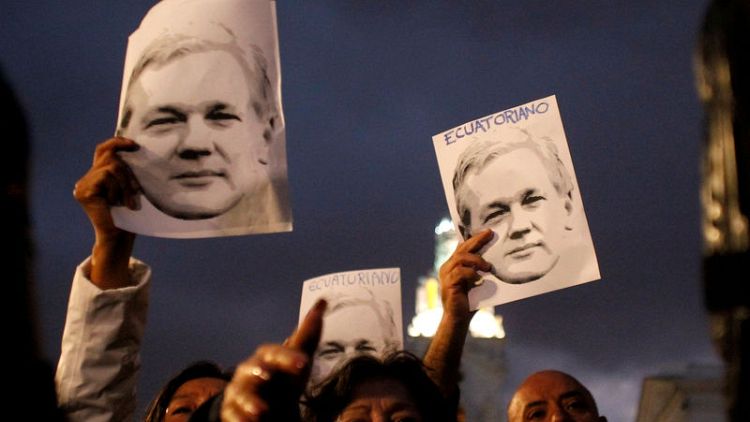GENEVA (Reuters) - The United Nations torture investigator called on Ecuador on Friday not to expel Wikileaks founder Julian Assange from its London embassy, voicing concerns that he could be extradited to the United States and possibly face mistreatment.
President Lenin Moreno of Ecuador told radio stations on Tuesday that Assange has "repeatedly violated" the terms of his asylum in its embassy, where he has lived for nearly seven years.
Moreno said that Assange does not have the right to "hack private accounts or phones" and cannot intervene in the politics of other countries, especially those that have friendly relations with the Andean nation.
Moreno made the comments after private photographs of him and his family at a time when they were living in Europe circulated on social media. Although Moreno stopped short of explicitly blaming Assange for the leak, the government said it believed the photos were shared by WikiLeaks.
If Assange were expelled, he is likely to be arrested by British authorities and extradited to the United States, Nils Melzer, U.N. special rapporteur on torture, said in a statement voicing concern that Assange's health was in "serious decline".
“Such a response could expose him to a real risk of serious violations of his human rights, including his freedom of expression, his right to a fair trial and the prohibition of cruel, inhuman or degrading treatment or punishment," he said.
“I therefore urge the Government of Ecuador to abstain from expelling Mr. Assange from its Embassy in London, or from otherwise ceasing or suspending his political asylum until such time as the full protection of his human rights can be guaranteed," Melzer said.
INVESTIGATIONS
Assange took refuge in Ecuador's London embassy in 2012 to avoid being extradited to Sweden, where authorities wanted to question him as part of a sexual assault investigation.
That investigation was later dropped, but Assange fears he could be extradited to face charges in the United States, where federal prosecutors are investigating WikiLeaks.
Melzer also urged British authorities to refrain from expelling or extraditing Mr. Assange to the United States or any other jurisdiction, until his right to asylum under refugee law or international human rights law has been determined.
In a separate statement also issued in Geneva on Friday, the U.N. special rapporteur on the right to privacy, Joe Cannataci, said that he planned to meet Assange on April 25 "after receiving assurances from the Government of Ecuador that it will facilitate his visit to the country’s embassy in London".
Cannataci said the meeting would help determine "if there exists a prima facie case of violation of privacy that warrants further investigation."
He was requesting further information from the Ecuadorean government on a complaint lodged by Moreno that his privacy had been violated by publication of personal data illegally obtained by a website involved in the so-called “INA Papers” scandal.
(Reporting by Stephanie Nebehay; Editing by Andrew Heavens)


